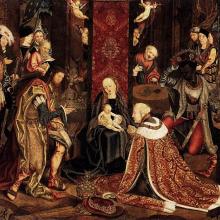egyptian spring
One of my must reads is the Sunday New York Times Book Review. There are too many books being published that I would love to read, but don’t have the time. So, I rely on reading book reviews as one way of keeping in touch with what’s being written.
Last Sunday, the Review ran an essay on how books affect Washington policy makers. Lawrence Summers, former director of the National Economic Council, says that a good review can often summarize what’s necessary for a policy maker to learn. He was quoted as saying, “If you tell me that the policy makers are reading the reviews, not the books, I don’t take that as evidence that the books aren’t influential.”
While I don’t fancy myself as a policy maker, the sentiment is also true for the rest of us.
Learn about two such new titles that may have an impact on public policy inside the blog...

A 16th-century depiction of the Epiphany from Germany. Via http://bit.ly/yeOf4J
Activist theologian Bill Wylie-Kellermann wrote that the Epiphany season "begins and ends in light. From the heavenly star to the radiant robes of transfiguration, Epiphany is about revelation, the kind of sudden brightness that lights up the landscape of a mind or a community or a whole social order. The light reveals, but not passively; it summons and sends."
In popular understanding, of course, Epiphany is about the visit of the Magi, "wise men" from the East bearing gifts for the newborn Christ child. Since these Gentile visitors come from foreign lands, their search for Jesus and their homage to him have stood as sign and symbol that Christ's salvation knows no boundaries. (The parallels with our age, with the potential of digital media to transcend all boundaries, begin to suggest themselves.)
The story of the Magi has a dark side as well, mostly ignored in Christendom's celebration of Epiphany. On their way to find the babe, the travelers pay a visit first to Herod's court, where they're told to report back to him the location of the newborn. Fortunately, the wise men practice direct civil disobedience to the royal command, and thus they and the holy family escape Herod's wrath. But the children of Bethlehem, the "holy innocents," suffer the tragic consequences of Herod's duplicity. The lessons about relating to authority (i.e., the need to be "wise as serpents") are loud and clear.
Just days before the country’s first democratic election (set for Nov. 28), 27 Coptic protestors were killed for demonstrating against the military’s recent burning of a Christian community center. And despite drawing global attention, which included anti-violence demonstrations in the U.S., Canada, and Europe, the Global Post reports that, "the demonstrations reflect mounting fears in Egypt’s Coptic community and its Diaspora that after the pro-democracy uprising of earlier this year the predominantly Muslim Egyptian society seems as indifferent to the Christian minority’s concerns as ever. “

